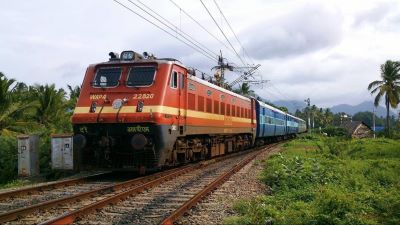Context:
India's vast railway network, catering to over 2.3 crore passengers daily, plays a critical role in the nation's transportation infrastructure. While concerns about rail safety have been largely centered around accident-related emergencies, the imperative of addressing non-accident-related medical emergencies often takes a backseat. The Balasore train accident in June 2023 brought attention to rail safety, but it is essential to delve deeper into the provision of medical care for the high volume of passengers.
Evolution of Medical Care Provisions:
In 1995, recognizing the need for emergency medical care, Indian Railways introduced a 'special first aid box' in long-distance superfast trains like Shatabdi and Rajdhani. This initial kit, designed for use by a doctor on board, contained 49 items. Over the years, this evolved into the 'augmented first aid box' with 58 items, specifically provided for select long-distance trains. A significant step in 1996 involved stationing a medical team on two long-distance trains as part of a pilot project. However, the subsequent four years revealed underutilization, with the medical team attending mostly to minor ailments, leading to the discontinuation of the service.
A 1996 petition in the Rajasthan High Court prompted action, resulting in a 2005 judgment that mandated the reservation of four berths in long-distance trains for medical care. However, the Railways appealed this order in 2006, citing the failure of pilot initiatives like chemist stalls at stations and doctors in select stalls. The Supreme Court, in 2017, directed the Railways to establish a committee with experts from AIIMS to recommend further measures. The subsequent modifications included changes in the contents of first aid boxes, their availability at all stations and trains, and mandated first-aid training for railway staff. The current status reflects the implementation of these recommendations, as stated by the Minister of Railways in 2018.
Challenges and Criticisms:
Despite the apparent progress, challenges persist in the provision of medical care on Indian trains. A notable incident in December 2023, where a passenger experienced symptoms indicative of a heart attack on a Vande Bharat express, highlighted the inadequacies of the emergency kit on board. The kit lacked essential items, such as a blood pressure monitor and a glucometer, while the available aspirin was nearing expiration. Subsequent inspection revealed that the train seemed to be using an outdated 1995 list instead of the updated 2017 list, indicating gaps in implementation.
Medical professionals have expressed concerns about the completeness of the recommended lists. They propose additional items, including personal protective equipment for care providers and a pulse oximeter, based on observed cases at emergency care centers. Furthermore, the evolving landscape of healthcare suggests the need for incorporating portable ECG devices and rapid diagnostic kits to identify and address heart attacks promptly.
The Way Forward:
To enhance medical care on Indian trains, several immediate steps can be taken.
Firstly, ensuring that the updated 88-item list from 2017 is uniformly implemented across all trains is crucial. This includes periodic inspections to maintain the quality of care provided. Passengers must also be made aware of the available medical services.
Secondly, incorporating recent advancements in point-of-care diagnostics, such as portable ECG devices and rapid diagnostic kits, can significantly improve the capability to identify and address medical emergencies swiftly.
Moreover, the Railways must establish a comprehensive system to capture data on the healthcare needs of passengers during train travel. This data-driven approach can inform policy decisions, allowing for a more proactive and targeted response to emerging health trends among railway passengers.
Additionally, collaborations with healthcare professionals, organizations, and medical device research entities can contribute valuable insights and innovations to further enhance medical care provisions on Indian trains.
Conclusion:
The provision of medical care on Indian Railways is a complex challenge that requires a multifaceted approach. While past efforts have brought about improvements, recent incidents and expert opinions indicate the need for continuous refinement and adaptation to evolving healthcare standards. The Railways' commitment to implementing recommendations and embracing technological advancements will be pivotal in ensuring the safety and well-being of the millions of passengers who rely on this extensive transportation network. As the nation progresses, so must the medical care provisions on its trains, reflecting a commitment to the health and security of every passenger.
|
Probable Questions for UPSC Mains Exam 1. What challenges persist in providing medical care on Indian trains, and how can the incorporation of recent advancements in point-of-care diagnostics contribute to addressing these challenges? (10 marks, 150 words) 2. In the evolution of medical care provisions on Indian Railways, what are the key milestones, challenges, and criticisms encountered, and how can a comprehensive data-driven approach enhance the overall effectiveness of healthcare services for passengers? (15 marks, 250 words) |
Source – The Hindu







